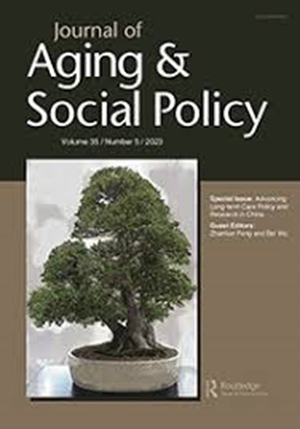Assessing Age-Friendliness: Individualistic vs. Collectivistic Cultures
IF 2
3区 社会学
Q2 GERONTOLOGY
引用次数: 6
Abstract
ABSTRACT A major task ahead for South Korea is to create age-friendly communities and environments that can support older residents’ health, well-being, and quality of life. To that end, international partnerships have emerged to share information, assess need, and develop response strategies. In this study, the transferability of a US-developed age-friendly community resident survey, based on the WHO framework, was tested in two South Korean cities by comparing results to the same survey conducted in a US city. Descriptive, relational, and predictive analyses revealed the survey items were a better fit for the US city than the South Korean cities. Limited response variances collected in the Korean cities challenged the comparison of data between the Korean sites. Thus, a cultural lens was used to explain response patterns that reflect their understanding of social norms including avoiding disagreement and conflict in order to maintain social equilibrium and five cultural dimensions found in Western and Eastern societies (Individualism vs. collectivism, universalism vs. particularism, low vs. high power distance, low vs. high context, and inner vs, outer control). Recommendations for future assessments in South Korea include shifting focus away from the individual to the individual’s social network and community to improve understanding of need.评估年龄友好度:个人主义与集体主义文化
摘要:韩国面临的一项主要任务是创建有利于老年人的社区和环境,以支持老年居民的健康、福祉和生活质量。为此,建立了国际伙伴关系,以分享信息、评估需求和制定应对战略。在这项研究中,根据世界卫生组织的框架,通过将结果与在美国一个城市进行的同一项调查进行比较,在两个韩国城市测试了美国开发的老年友好社区居民调查的可转移性。描述性、相关性和预测性分析显示,这些调查项目比韩国城市更适合美国城市。在韩国城市收集到的有限响应差异对韩国站点之间的数据比较提出了质疑。因此文化视角被用来解释反应模式,这些模式反映了他们对社会规范的理解,包括避免分歧和冲突,以保持社会平衡,以及在西方和东方社会中发现的五个文化维度(个人主义与集体主义,普遍主义与特殊主义,低权力距离与高权力距离,低背景与高背景,内部控制与外部控制)。韩国未来评估的建议包括将重点从个人转移到个人的社交网络和社区,以提高对需求的理解。
本文章由计算机程序翻译,如有差异,请以英文原文为准。
求助全文
约1分钟内获得全文
求助全文
来源期刊

Journal of Aging & Social Policy
GERONTOLOGY-
CiteScore
13.00
自引率
3.90%
发文量
57
期刊介绍:
The Journal of Aging & Social Policy offers a platform for insightful contributions from an international and interdisciplinary group of policy analysts and scholars. It provides an in-depth examination and analysis of critical phenomena that impact aging and the development and implementation of programs for the elderly from a global perspective, with a broad scope that encompasses not only the United States but also regions including Europe, the Middle East, Australia, Latin America, Asia, and the Asia-Pacific rim.
The journal regularly addresses a wide array of issues such as long-term services and supports, home- and community-based care, nursing-home care, assisted living, long-term care financing, financial security, employment and training, public and private pension coverage, housing, transportation, health care access, financing, and quality, family dynamics, and retirement. These topics are of significant importance to the field of aging and social policy, reflecting the journal's commitment to presenting a comprehensive view of the challenges and solutions related to aging populations around the world.
 求助内容:
求助内容: 应助结果提醒方式:
应助结果提醒方式:


